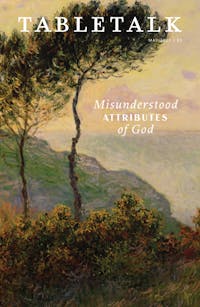
Request your free, three-month trial to Tabletalk magazine. You’ll receive the print issue monthly and gain immediate digital access to decades of archives. This trial is risk-free. No credit card required.
Try Tabletalk NowAlready receive Tabletalk magazine every month?
Verify your email address to gain unlimited access.
When I first read Sinclair Ferguson’s book The Holy Spirit in 1999, I was drawn to a quote from Thomas Aquinas that is quoted in the preface: “Theology proceeds from God, teaches us about God, and leads us to God.” That statement profoundly affected me. It helped me grasp what theology is, why it exists, and what it does.
As I read Dr. Ferguson’s book, I came to realize that he was not only teaching me theology, but he was also teaching me how to do theology. Throughout his book, Dr. Ferguson worked out his guiding principle that what we know about God must come from what God has revealed in His infallible Word, which teaches us about God so that we might know Him rightly.
But theology doesn’t exist as an end in itself. We don’t study theology merely to know theology but to know God. D. Martyn Lloyd-Jones wrote, “As theology is ultimately the knowledge of God, the more theology I know, the more it should drive me to seek to know God.” Right, biblical theology that comes from God will necessarily lead us back to know, love, and worship God, and that’s precisely what Dr. Ferguson was teaching me in his book. His way of teaching theology has led me not only to know theology but to know God and to worship the God of Scripture, not the god of my own making.
This is one reason that we read books, write books, and publish magazines such as Tabletalk—that we might know, love, glorify, and enjoy God more and more in all that we think, say, and do. Therefore, while the subject of this issue of Tabletalk might seem a little academic for some, it is nevertheless necessary for Christians to study. Due to poor teaching and theological misunderstanding, even churches that hold fast to Scripture as God’s inerrant Word are unwittingly raising a generation of people who unknowingly profess heresy more than the theology of the Bible. The desperate need of our generation is not only for the world to know God but, as Dr. R.C. Sproul emphasized, for the church to know God. To know God means to know our theology, and to know our theology means to know God’s revelation about Himself to the end that we might be led back to God, by the grace of God, through the power of God the Holy Spirit, to worship God so that God alone might get the glory. Simply put, sound theology leads to doxology.
